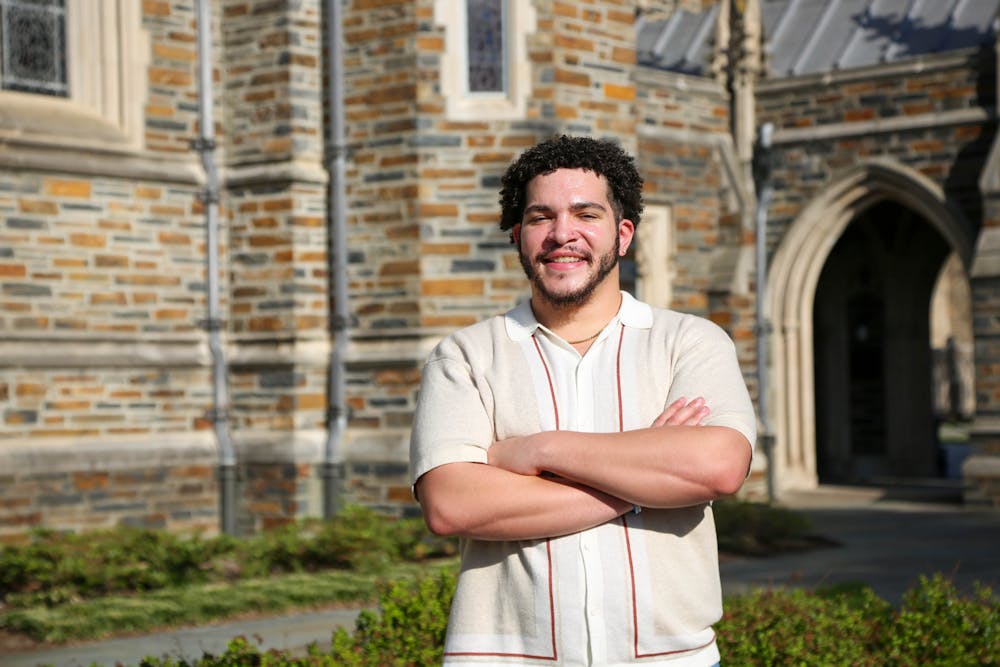Duke Student Government presidential candidate Isaiah Hamilton hopes to tackle the issues and concerns of underrepresented groups by prioritizing diversity, equity and inclusion work in his platform.
A junior from Elizabeth City, N.C. majoring in biology and global health, Hamilton considers himself to wear many hats on campus — he’s president of the Black Student Alliance, president pro tempore of DSG and secretary for the Alpha Alpha Chi Chapter of the Phi Beta Sigma fraternity.
Hamilton feels that student groups who’d benefit the most from DSG’s advocacy are not currently receiving the support they deserve.
“The biggest caveat and elephant in the room … is that there are people on campus who disproportionately suffer from these systems and structures, who have the short end of the stick,” Hamilton said. “How do we be more equitable and change the mindset of advocating for people who already have a large stake versus people who have the shorter stake?”
He hopes to lead DSG similarly to how he has run BSA — by bringing a “personalized touch,” which comes with feeling a sense of comfort in the spaces he inhabits.
Hamilton joined both DSG and BSA in his first year as an ad-hoc senator and committee member, respectively. As a sophomore, Hamilton remained a DSG senator, became chief of staff of BSA and joined his fraternity, using these opportunities to “study the lay of the land.” He then advanced to the role of DSG’s president pro tempore this year.
“I have a pulse check on where the current proceedings and internal functioning of student government is,” he said. “I have a very unique perspective when it comes to … the intersection between how student government attempts to do the work they do versus what the real needs and wants of an underrepresented community, like Black Duke, [are].”
Hamilton pointed out that he thinks “[DSG is] really far too comfortable with our current internal proceedings and that there needs to be a large cultural shift that comes with student government and how student government is run. A priority should always be within the students and student groups who benefit from DSG advocacy and [whether they’re] receiving that support that they deserve.”
He hopes to offload day-to-day operational responsibilities to “give the president more flexibility to run their campaign.”
“[DSG presidents] exist in this veil of running a full platform … but people don’t realize the day to day of it is actually a lot of meetings, a lot of one-on-ones, a lot of … search committees. You don’t have, in the current structure, a lot of flexibility to run your campaign once you’re in position,” Hamilton said.
The campaign Hamilton hopes to run involves three pillars — inclusivity, mindfulness and humility — matching his initials, IMH.
For inclusivity, Hamilton aims to increase inclusive spaces for marginalized students, increase the accessibility of student engagement and event planning resources, and increase the diversity of Duke’s curriculum. In terms of space, Hamilton in particular listed the renovation and relocation of National Panhellenic Council plots, “leveraging the restoration of the Mary Lou Williams Center for Black Culture to make that space more welcoming to ... the larger African and African American diaspora and Caribbean diaspora,” utilizing Central Campus for programming by allowing students to reserve space with DSG fund codes.
Academically, he seeks to promote new faculty hires for Indigenous professors and increase academic calendar flexibility to accommodate holidays for students of different religions. He also noted that he hope to “strengthen and institutionalize existing programs that promote diversity,” such as the Latin American Studies certificate and African and American Studies at Duke.
Under his mindfulness pillar, Hamilton hopes to publicize and streamline mental health resources through a one-stop-shop website. He also seeks to provide more late-night food options, such as frozen meals at vending machines.
His platform also pushes to expand mental health training to include specialized eating disorder training for hotline workers.
“There’s very seldom any discussions around eating disorders [at Duke.] I want to advocate for that training for DukeReach and DukeLine workers and ideally increase the availability of trained individuals on campus,” he said.
Under this second pillar, he also hopes to work with DuWell to institutionalize addiction peer support groups, further publicize and support the expansion of safe transportation, such as Duke’s Lyft Rides program, and establish more comprehensive orientation programming.
The goals of Hamilton’s last pillar include fostering collaboration with student groups, increasing DSG’s transparency and accessibility, and creating inclusive structures and civic engagement opportunities.
He pointed to publicizing the DSG presidential hotline more, which he says currently “no one uses,” re-institutionalizing the DSG members’ office hours, and creating a “feedback or survey that will allow us to have a pulse check on how we’re doing and how ways we can improve accessibility to DSG.” Hamilton further hopes to bring back town halls to improve direct communication between students and DSG members.
“There’s no one size fits all when it comes to how we support every single group … My goal is to meet every single group where they're at if they’re willing,” Hamilton said.
Get The Chronicle straight to your inbox
Sign up for our weekly newsletter. Cancel at any time.
Hamilton is also passionate about establishing a diversity, equity and inclusion chair within DSG, a position that would either be independent or work closely with the executive vice president.
“I want that position to work to connect with student groups to ensure that like broader recruitment is being advertised to students, and we work very early on to try to make those connections within groups,” he said.
Bethzaida Fernandez, senior lecturer of romance studies, got to know Hamilton when he joined her Costa Rica study abroad cohort in the summer of 2022. She was most impressed with his “great sense of curiosity and disposition for learning.”
“Being president of a student body entails immense collaborative skills and conscientious work. It requires a young leader who can maintain channels of communication open and who knows how to work with different points of view for the benefit of all ... [Hamilton] is very supportive of his peers and a great advocate for them, constantly looking out for everyone’s wellbeing,” she wrote in an email to The Chronicle.
Senior Kyle Brandon Denis, one of Hamilton’s fraternity brothers, describes Hamilton as one of the most selfless people that he has met in his almost four years at Duke, and someone who, as president, would “leave an indelible impact on the Duke community.”
“I admire his ability to balance all his responsibilities and commitments, and still find a way to show up as the most compassionate human and friend that a person could ask for,” Denis wrote. “Isaiah’s determination is probably one of his defining traits. This is a young man that persists and finds solutions even when things seem impossible or hopeless.”

Ayra Charania is a Trinity junior and a senior editor of The Chronicle's 118th volume.

